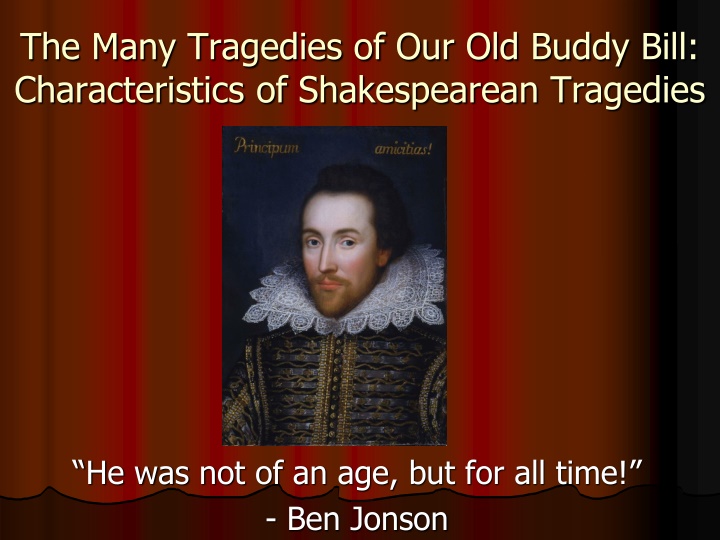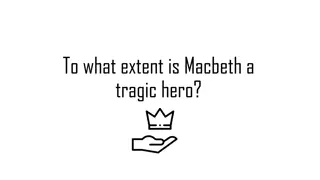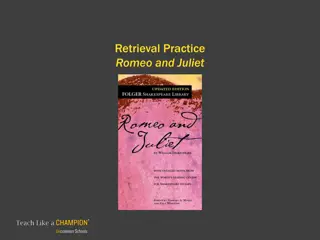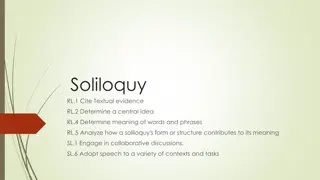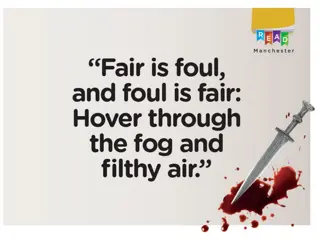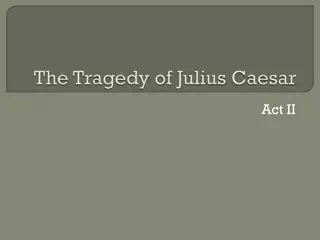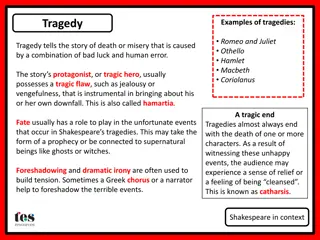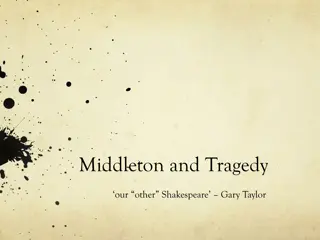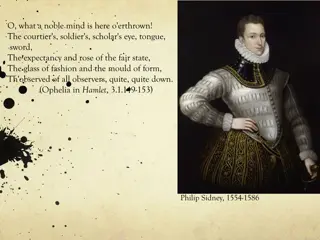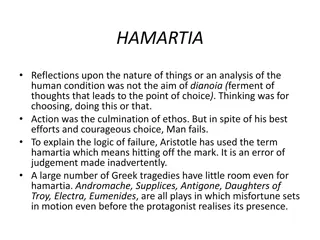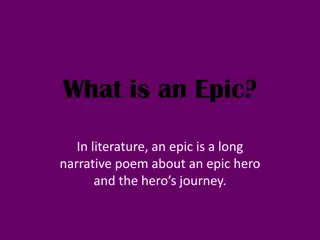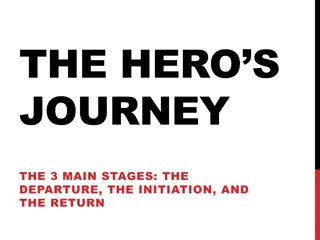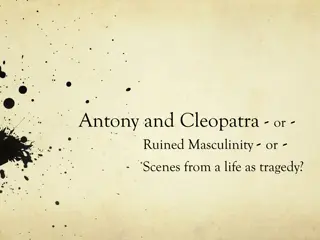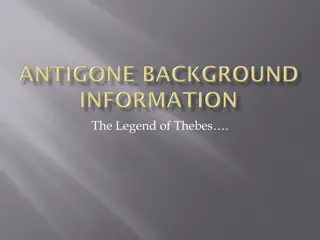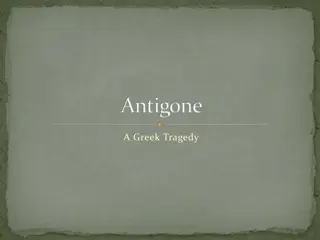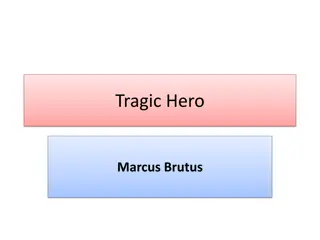Unveiling Shakespearean Tragedies: The Path of the Tragic Hero
Delve into the world of Shakespearean tragedies and explore the characteristics of the tragic hero, from Hamartia to catharsis. Discover how the downfall of these powerful figures leads to cathartic experiences for audiences, invoking emotions of pity and fear. Uncover the defining elements that make these timeless tales captivating and deeply impactful.
Download Presentation

Please find below an Image/Link to download the presentation.
The content on the website is provided AS IS for your information and personal use only. It may not be sold, licensed, or shared on other websites without obtaining consent from the author.If you encounter any issues during the download, it is possible that the publisher has removed the file from their server.
You are allowed to download the files provided on this website for personal or commercial use, subject to the condition that they are used lawfully. All files are the property of their respective owners.
The content on the website is provided AS IS for your information and personal use only. It may not be sold, licensed, or shared on other websites without obtaining consent from the author.
E N D
Presentation Transcript
The Many Tragedies of Our Old Buddy Bill: Characteristics of Shakespearean Tragedies He was not of an age, but for all time! - Ben Jonson
ON A LINED PIECE OF PAPER Record the questions below (answer these questions as you click through this presentation- bring your completed Questions/Answers to class on Wednesday 2/8) 1. What is 1 example of a tragic hero? 2. What type of men are commonly tragic heroes? 3. What is catharsis? 4. What is Hamartia 5. What is External Conflict? 6. What is 1 difference between a soliloquy and an aside? 7. What is a foil?
The Tragic Hero Usually there is only one tragic hero. Examples: Hamlet Macbeth Othello King Lear Exceptions- The Love Tragedies (i.e. Romeo and Juliet)
The tragic heroes in Shakespeare are commonly men in power Example: People in power, like princes, might feel the pains of despised loved just like you and I. The difference would be that when we feel that pain it cant affect a nation or a kingdom. The tragic heroes pain and failure is felt by everyone. Tragic heroes are never just peasants. You and I are peasants. We are normal everyday people. We do not inspire pity and fear like great heroes/heroines do. Plus their failure must be much greater, we have no where to fall while their fall is much greater.
It wouldnt be tragedy if there wasnt a death or two or three or .. Plot 1. The tragic story leads up to, and includes, the death of the hero. 2. The suffering and calamities that befalls the hero are unusual and exceptionally disastrous.
The calamity of the hero and catharsis. The hero undergoes a sudden reversal of fortune. This reversal arouses the emotions of pity and fear in the audience, which is called catharsis. The reversal may frighten and awe, making the audience or readers feel that he/she is the plaything of a higher power that may smile on the hero one moment, and the strike the prideful hero down in the next.
Hamartia: The Tragic Flaw Hamartia (Greek)- In tragedy, the quality within the tragic hero/heroine which leads to his/her downfall. The fall often takes the form of an obsession. Examples: Macbeth s obsession with power. Othello s jealousy. King Lear gullibility and lack of judgment.
It wouldnt be a Shakespearean Tragedy with out someone going insane. Shakespeare often introduces abnormal conditions of mind such as: madness, hallucinations or manic depression.
Shakespearean Tragedies always have some supernatural element Shakespeare introduces the supernatural: ghosts and witches who have supernatural knowledge. The supernatural elements cannot be explained away as an illusion in the mind of one of the characters. It does contribute to the action, but it is always placed in the closest relation with the character.
Conflicts External Conflict Internal Conflict The struggle between the main character and an outside force in a literary work such as nature or other characters. The struggle between the main character and his/herself throughout a literary work. It is usually a torment within the soul of the tragic hero.
The ultimate power in Shakespearean Tragedies The ultimate power in the tragic world is a moral order the conflict between good and evil. The entire world order is disrupted as a result of the tragedy.
The Cycle of Tragedy A cycle of tragedy must be completed: Good Evil Chaos Final Conflict Hero s Realization Death Re-assertion of good and restoration of order
Other specific elements in a Shakespearean Tragedy
Dramatic Irony When the reader (or audience) knows something about current or future circumstances that the character or characters do not know.
Soliloquy A monologue spoken by an actor at a point in the play when the character believes himself to be alone. The technique frequently reveals a character's innermost thoughts, including his feelings, state of mind, motives or intentions. The soliloquy often provides necessary but otherwise inaccessible information to the audience. The dramatic convention is that whatever a character says in a soliloquy to the audience must be true, or at least true in the eyes of the character speaking (i.e., the character may tell lies to mislead other characters in the play, but whatever he states in a soliloquy is a true reflection of what the speaker believes or feels).
Aside In drama, a few words or a short passage spoken by one character to the audience while the other actors on stage pretend their characters cannot hear the speaker's words. It is a theatrical convention that the aside is not audible to other characters on stage. Contrast with soliloquy. The aside is usually indicated by stage directions.
Foils A character that serves by contrast to highlight or emphasize opposing traits in another character. For instance, in the film Clerks, the character Silent Bob is a foil for his partner, Jay, who is loquacious and foul-mouthed.
Comic Relief A humorous scene, incident, character, or bit of dialogue occurring after some serious or tragic moment. Comic relief is deliberately designed to relieve emotional intensity and simultaneously heighten and highlight the seriousness or tragedy of the action. Macbeth contains Shakespeare's most famous example of comic relief in the form of a drunken porter.
